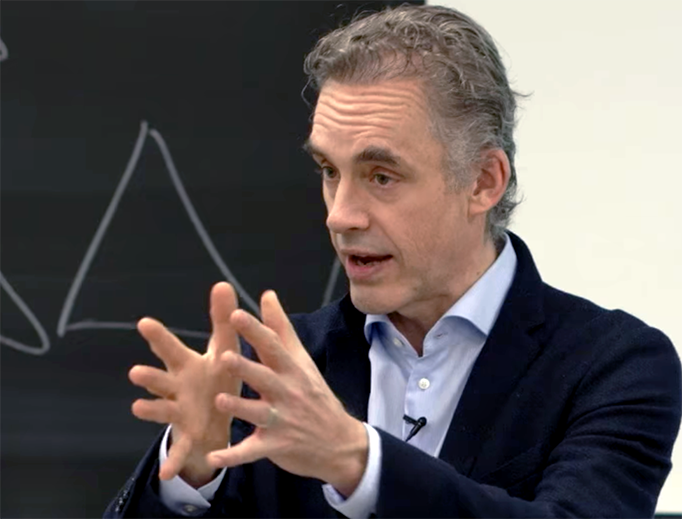Art and Culture
Why Jordan B Peterson Appeals to Me (And I Am on the Left)
Peterson’s critics would be helping him refine his theories and hone his argumentation, moving our cultural conceptions of human nature forward.

As a writer who identifies as a leftist, and who sympathizes with Noam Chomsky’s anarcho-syndicalism on a root personal level, I should theoretically be joining the chorus of critics who have decided that Jordan Peterson is a reactionary.
In fact, Jordan Peterson has plenty of followers on the left, but watching the media climate surrounding his book release, you’d think he appeals only to the most reactionary, hyper-masculine discontents of the modern world. To be fair to the journalists, it is true that there are two Jordan Petersons. There is the lecturer, who juxtaposes mythological and religious themes with psychology and evolutionary biology, presenting a synthesis of science and religion, and then there is the social media culture warrior. Watching Peterson’s lectures versus watching snippets of him online, in recent interviews, you are watching two different men. It’s what the digital era does to people – it fragments them. Hundreds of hours of brilliant speeches are to be judged based on a few soundbites on Mic or Vice, or whatever dense abstractions can be made to look absurd by a political writer with no interest in Peterson’s field, such as Nathan Robinson.
But Peterson’s critics have barely engaged with his basic claims. Maps of Meaning is an attempt to take the wisdom of religion and ancient cultures and explain, through a contemporary lens of modern psychology, what these cultures got right. It is an attempt to revive the past as a source of deep knowledge, not wreckage to be discarded at the altar of scientific materialism, or a postmodern presentism.

Jordan B Peterson
Peterson’s argument is simple: repeated cultural symbols, in large part, represent aspects of our psychobiological nature, and many of these symbols have been expressed universally across cultures through myths, legends and archetypes. Such symbols may include the snake swallowing its own tail (chaos) and the heroic individual (the Self emerging out of chaos). This Jungian work may be difficult to read, and to validate empirically, but it is not subjective mist. Its basic assumptions derive from neuroscience, evolutionary biology and developmental psychology. Unlike postmodern thought, Peterson’s work is built on synthesising what we know from the behavioural sciences with the vast accumulated record of mythological story-telling and what these stories tell us about human nature. It is an ambitious project that no other public intellectual has dared to provide in an age that is exhausted and cynical of grand narratives.
In a better world, Peterson’s critics would be helping him refine his theories and hone his argumentation, moving our cultural conceptions of human nature forward. Instead, the caliber of his critics, and their desire to completely dismiss Peterson as a fraud, have created parallel worlds that do not meet.
Of course, criticism of any public intellectual is always going to occur. Any person who promotes their ideas in the public sphere is going to be scrutinised, often robustly. But the hatchet jobs on Peterson have possessed a particularly malicious tone. One wonders if Western intellectuals as a class have simply become complacent, fat, and soft-in-the-head. In The Guardian and The Baffler, Peterson is a “charlatan”, who uses “quackery”, and is obsessed with “conspiracy theories” of postmodern dominance.
And yet, the “conspiracy” of a postmodern intellectual class becomes a reality when the mere mention of basic scientific facts is condemned as reactionary and immoral. There is a sickly resistance to science among the left-leaning media class, where solid psychometric findings are treated as a matter of moralizing opinion. No doubt, to Peterson’s critics, such findings as average sex differences in occupational interest, or in personality traits such as agreeableness, classify as “pseudoscience.” And no doubt to Peterson’s critics, the notion that cognitive ability, or intelligence, is not arbitrary, and is also heritable, is also “pseudoscience” despite the fact that findings on intelligence are some of the most robust and replicable in all of social science.
These science-blind assumptions do real damage. If we assume that cognitive ability doesn’t matter, and build a society on ruthless ideas of meritocracy where only the cognitive elite can succeed, we will produce a broken system that will produce many, many losers. If boys and men are repeatedly told that masculinity is essentially “toxic” and in need of suppression, this may produce a society of angry, repressed men. At every level of our civilization, human biology is relevant, and engaging with it thoughtfully could not be of more critical importance. If we can’t be honest about the biological aspects of our nature now, how will we possibly deal with debates going into the future? Discussions around gene editing, cognitive enhancement, even artificial intelligence and automation are more crucial than ever. But if we cannot even agree on the basic scientific facts about our own fallible nature, how can we possibly agree on the right ways to proceed?
In an article titled “Jordan Peterson’s Bullshit” published in the Marxist magazine Jacobin, Harrison Fluss dismisses “real differences between men and women” without even attempting to address the research, let alone counter it.
Fluss’s viewpoint is so ideologically hammer-headed that his hit piece on Peterson argues that the tragedy of being does not come “from an inherently unknowable and mysterious world. It comes from capitalism.” Perhaps, if he had listened to Peterson’s lectures, he would understand that dramatic inequality not only preceded the industrial era, but also preceded the existence of humankind. If we want to do something about it (which we do), why pretend that suffering itself was a capitalist invention?

What is behind this near-uniform reaction from the moralizing, young, intellectual, media class? I almost certainly know what it is: guilt.
Living in a world of inequality, material and otherwise, inspires a profound sense of guilt that can only be suppressed by rejecting all claims to material hierarchy, human nature, and all the tragic inequalities that follow. It’s a sensible impulse, from the perspective of public virtue. I’m sure it feels like the right thing to do. But for the interests of building a cohesive society through the pursuit of truth, it could not be more maladapted.
I identify much more as a leftist than a conservative or a liberal. I have, for most of my life, opposed capitalism, and considered the capitalist world to be akin to fallen nature, a corrupted Eden. But the fatal problem for the left is that these grand, large-scale beliefs offer nothing in the way of defeating personal nihilism and cosmic futility. Peterson’s ideas, and the psychology of religion put forth in Maps of Meaning, resonate with me at a level much deeper than politics. Peterson’s lectures strive to illustrate the soul of the individual, something that is ultimately more compelling than any collective scheme to save the world from itself.
The problem is simple: journalists guilty about inequality portray Peterson as an anti-trans, Cold War lunatic. Then, people who read that commentary and end up watching videos from his Biblical Series, or his Maps of Meaning lectures, do not find a right-wing radical. Instead, they find a passionate lecturer against authoritarianism who is deeply invested in a symbolic, archetypal understanding of human nature. Now, they realize that all these left-leaning outlets have lied to them. Instead of exposing a bigot, they’ve smeared a serious scholar.
Then, the ordinary person’s distrust of the left only deepens.
Even Peterson’s radically-titled videos, such as “Identity Politics and the Marxist Lie of White Privilege”, do not focus on race, and are instead long lectures about individualism and the history of the Soviet Union. Yes, I find it unlikely that modern social justice movements have much in common with Stalin or Mao, and I think Peterson overestimates the organization and power of the modern left. But when complicated individuals, particularly existentialist Christians who argue for “Darwinian pragmatism”, are judged by a few soundbites, it creates an intellectual atmosphere of stagnation and spiritless conformity.
After all, those who consider acknowledging sex differences to be sexist cannot possibly be allowed to dictate the limits of acceptable discourse. Those who think that intelligence is an entirely subjective construct should not be allowed sit on the sidelines and tell everyone to get an elite education, drowning themselves into debt trying to learn skills they may not even be able to learn. The US military does not induct anyone with an IQ below 83 explicitly because intelligence is real, and predicts meaningful outcomes.
But to the postmodern left, all of this is completely, and totally taboo. There is no such thing as a “universal human nature” that is influenced by biology. To suggest that would be to “reinforce the status quo” and to suggest that, as Cathy Newman said, “we should model our societies in the image of the lobster”.
Peterson is accused of raising a postmodern boogeyman, but his core claim about postmodernism is true. In postmodern literature, there is no truth outside of discourse. The implications of that are devastating – it means that any scientific findings that make us uncomfortable do not emerge from objective reality, but are themselves constructs, or products of “straight white male bias”. If it is discovered that men and women differ in their interests, occupational choices or in certain personality traits, those findings are already part of a “discourse” on sexism, and cannot be objective. If you want to ruin Western civilization and break the sciences, you’d do no better than to make people believe that the scientific method is a tool of oppression.
The neo-Marxist addition to postmodernism may also seem sloppy, until you understand that any scientific inquiry confirming differences amongst people is ideologically incompatible with the Marxist faith that a world can exist with total equality. Marxist assumptions about a world without any natural hierarchy or limitations suppress a real understanding of individual differences. Worse, they also harm the working class by pretending that equality of outcome is possible, that men and women are identical, and that issues such as cognitive ability are only a concern of “fascists”. They destroy the study of society by attributing all difference to social oppression rather than actually understanding the issues at hand.
But the self-deception doesn’t end there. The choir of critics are utterly confused – they wish to argue that Peterson is a reactionary who is opposed to Enlightenment values, but at the same time they dismiss entirely his empirical work as a research psychologist, and practical experience as a clinician. These writers want to present Peterson’s illustration of the dominance hierarchies of lobsters as the equivalent of “pick-up artists” who fetishize domination and victory—as if there isn’t an entire field of science devoted to understanding the deep evolutionary significance of animal behavior. Here, the left’s scientific illiteracy is again painful. The authors of The Baffler’s “A Serious Man” cite “lazy science”, and consider problematic the notion that all people share an “innate psychobiological basis” which gives rise to universally appealing mythological narratives. They decry the notion that there could be such a thing that constitutes human nature, and consider it a reactionary attempt to avoid “alter[ing] our customs through rational critique”.
But this is all backwards! In order to alter anything, we must first understand it. To propose that an innate psychobiological human nature, which has been reflected in our cultural and mythological symbols, is a problem rather than a depiction, is the reason why the left is so incapable of changing the world. Carl Jung wrote in The Undiscovered Self that human beings, without knowledge of their individual and universal nature, will always collapse their rationality into the appeal of fascism and self-destructive movements. The Undiscovered Self is a deep appeal for knowledge of our universal human nature. Such knowledge, argued Jung, would be the basis from which an individual could behave thoughtfully.
This is the founding notion of Peterson’s project, as simply as it can be put: to offer self-knowledge in place of ideological fantasies of overthrowing the world.
Self-knowledge can only emerge from an honest confrontation with nature. Peterson simply points to biological mechanisms, hierarchies and differences that have been produced by hundreds of millions of years of evolution, and argues that this is the foundation we have to work with.
To be clear, I do not think that hundreds of millions of years of Darwinian evolution determines the future – but I also cautiously understand that if we seek to change ourselves, we cannot lie to ourselves about what our history has entailed. There is cooperation in nature, but as individuals, distinct from one another, we require judgements, values and hierarchies to differentiate ourselves and find meaning. If everyone is the same, and no hierarchies of quality can be established, then life returns to chaos: the Ouroboros, the ancient symbol of the snake swallowing its own tail, the place where there is no objectivity, no knowledge, only warmth and desire.

A 17th-century depiction of the serpent eating its own tail.
And once we go there, we’re living in denial, and the world will bully and beat us, and we will lack any defense other than the eternal cry that capitalism is responsible for it all, and so leftist ideology itself becomes a self-perpetuating hell where nothing can be done. The individual level, as Peterson, Jung, Emerson, Rumi and countless other thinkers in dialogue with both nature and the ephemeral soul understood, is the place to focus your attention. Until individuals are honest, the sum total of those individuals will be a mess of self-deception.
The blank slate journalists, in rejecting human nature and its individual manifestations, are rejecting their power to change the world they despise. As long as the media class dismisses descriptive analogies of human society and biological hierarchy as innately wrong for moral reasons, we will be no better than the religious dogmatists who rejected inconvenient science centuries ago.
So finally, I put forward a plea to my fellow travelers on the left, who view our ancient biological nature as an obstacle to progress: we must first come to terms with material reality and human nature if we ever seek to change it. Until we do that, we’ll remain culturally stagnant, and the most unscrupulous actors on the far right, and in totalitarian governments, will seize upon dominance hierarchies and difficult scientific studies to justify their horrible crimes. The left needs to get on board with understanding human nature, because it is through understanding, not denial, that real progress can be made.
Alexander Blum’s writing focuses on politics, mysticism and fiction. Visit his website here and follow him on Twitter @AlexanderBlum0.






